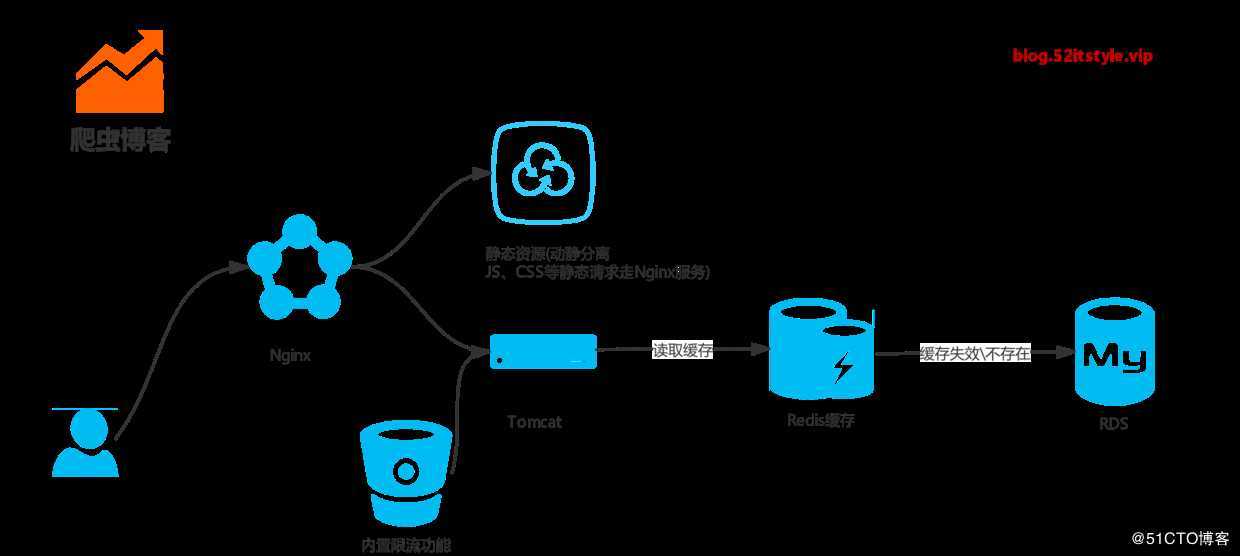SpringBoot开发案例之打造十万博文Web篇
Posted
tags:
篇首语:本文由小常识网(cha138.com)小编为大家整理,主要介绍了SpringBoot开发案例之打造十万博文Web篇相关的知识,希望对你有一定的参考价值。
前言通过 Python 爬取十万博文之后,最重要的是要让互联网用户访问到,那么如何做呢?
选型
从后台框架、前端模板、数据库连接池、缓存、代理服务、限流等组件多个维度选型。
- 后台框架 SpringBoot2+、JPA
- 前端框架 Vue
- 模块框架 Thymeleaf
- 数据库连接池 HikariCP
- 缓存 Redis
- 限流 Guava
- 代理服务 nginx
- 文章编辑 Markdown
架构

博文
我们可以通过以下方式访问:
https://blog.52itstyle.top/49.html亦或是:
https://blog.52itstyle.top/49.shtml当然,如果你愿意你也可以显示为:
https://blog.52itstyle.top/49.php
https://blog.52itstyle.top/49.asp
https://blog.52itstyle.top/49.jsp只需要在后台配置对应的映射关系即可:
/**
* 博文
*/
@RequestMapping("id.html")
public String blog(@PathVariable("id") Long id, ModelMap model)
Blog blog = blogService.getById(id);
model.addAttribute("blog",blog);
return "article";
由于数据库存储的是 markedown 格式的数据,前台我们通过 editormd 转为 html 代码显示,这里只展示部分代码:
<script type=‘text/javascript‘ src=‘js/jquery.min.js‘></script>
<!--省略部分代码-->
<script type=‘text/javascript‘ src="editor/editormd.min.js"></script>
<!--省略部分代码-->
<div id="article">
<textarea th:text="$blog.content" style="display:none;" placeholder="markdown语言">
</textarea>
</div>
<!--省略部分代码-->
<script>
editormd.markdownToHTML("article",
htmlDecode : "style,script,iframe",
emoji : true,
taskList : true,
tex : true, // 默认不解析
flowChart : true, // 默认不解析
sequenceDiagram : true // 默认不解析
);
</script>缓存
爬取的博文一般、基本、大概不会修改,所以我们完全可以缓存起来,避免跟数据库直接交互,顺便提升一下访问速速。正好手头有个 256MB 的阿里云 Redis 服务,拿来就用了。
首相引入以下组件:
<dependency>
<groupId>org.springframework.boot</groupId>
<artifactId>spring-boot-starter-cache</artifactId>
</dependency>
<dependency>
<groupId>org.springframework.boot</groupId>
<artifactId>spring-boot-starter-data-redis</artifactId>
</dependency>配置 redis:
spring.redis.database=1
spring.redis.host=r-m5e4873fd882de14.redis.rds.aliyuncs.com
spring.redis.port=6379
spring.redis.password=6347888
spring.redis.pool.max-active=8
spring.redis.pool.max-wait=-1
spring.redis.pool.max-idle=8
spring.redis.pool.min-idle=0
spring.redis.timeout=3000ms
spring.cache.type = redis接口实现,引入 Cacheable 注解:
@Override
@Cacheable(cacheNames ="blog")
public Blog getById(Long id)
String nativeSql = "SELECT * FROM blog WHERE id=?";
return dynamicQuery.nativeQuerySingleResult(Blog.class,nativeSql,new Object[]id);
配置完成之后,我们打开数据库配置,多次访问博文地址,如果只是初次打印 SQL 说明配置成功:
spring.jpa.show-sql = true限流
万一哪天流量暴涨亦或是有人恶意干坏事,尔等小服务器根本扛不住,所以有时候我们需要一定的手段进行限流,比如限制IP访问的频率次数。
这里我们使用开源的第三方组件库,引入以下组件:
<dependency>
<groupId>com.google.guava</groupId>
<artifactId>guava</artifactId>
<version>25.1-jre</version>
</dependency>自定义注解:
/**
* 自定义注解 限流
*/
@Target(ElementType.PARAMETER, ElementType.METHOD)
@Retention(RetentionPolicy.RUNTIME)
@Documented
public @interface ServiceLimit
/**
* 描述
*/
String description() default "";
/**
* key
*/
String key() default "";
/**
* 类型
*/
LimitType limitType() default LimitType.CUSTOMER;
enum LimitType
/**
* 自定义key
*/
CUSTOMER,
/**
* 根据请求者IP
*/
IP
限流逻辑:
/**
* 限流 AOP
*/
@Aspect
@Configuration
public class LimitAspect
//根据IP分不同的令牌桶, 每天自动清理缓存
private static LoadingCache<String, RateLimiter> caches = CacheBuilder.newBuilder()
.maximumSize(1000)
.expireAfterWrite(1, TimeUnit.DAYS)
.build(new CacheLoader<String, RateLimiter>()
@Override
public RateLimiter load(String key)
// 新的IP初始化 每秒只发出5个令牌
return RateLimiter.create(5);
);
//Service层切点 限流
@Pointcut("@annotation(com.itstyle.blog.common.limit.ServiceLimit)")
public void ServiceAspect()
@Around("ServiceAspect()")
public Object around(ProceedingJoinPoint joinPoint)
MethodSignature signature = (MethodSignature) joinPoint.getSignature();
Method method = signature.getMethod();
ServiceLimit limitAnnotation = method.getAnnotation(ServiceLimit.class);
ServiceLimit.LimitType limitType = limitAnnotation.limitType();
String key = limitAnnotation.key();
Object obj;
try
if(limitType.equals(ServiceLimit.LimitType.IP))
key = IPUtils.getIpAddr();
RateLimiter rateLimiter = caches.get(key);
Boolean flag = rateLimiter.tryAcquire();
if(flag)
obj = joinPoint.proceed();
else
throw new RrException("小同志,你访问的太频繁了");
catch (Throwable e)
throw new RrException("小同志,你访问的太频繁了");
return obj;
收录
完事具备,就差被搜索引擎收录了,我们可以通过手动生成网站地图,提交给百度。
/**
* 生成地图
* 参见:https://blog.52itstyle.top/sitemap.xml
*/
@Component
public class SitemapTask
@Autowired
private DynamicQuery dynamicQuery;
protected Logger logger = LoggerFactory.getLogger(getClass());
@Value("$blog.url")
private String blogUrl;
//每天23点执行一次
@Scheduled(cron = "0 0 23 * * ?")
public void createSitemap()
logger.info("定时提交百度收录开始");
StringBuffer xml = new StringBuffer();
xml.append("<?xml version=‘1.0‘ encoding=‘utf-8‘?>\n");
xml.append("<urlset>\n");
String nativeSql = "SELECT id,create_time FROM blog";
List<Object[]> list = dynamicQuery.query(nativeSql,new Object[]);
list.forEach(blog ->
String url = blogUrl+blog[0]+".html";
xml.append(" <url>\n");
xml.append(" <loc>"+url+"</loc>\n");
xml.append(" <lastmod>"+blog[1]+"</lastmod>\n");
xml.append(" </url>\n");
);
xml.append("</urlset>\n");
saveAsFileWriter(xml.toString());
logger.info("定时提交百度收录结束");
private static void saveAsFileWriter(String content)
String path = ClassUtils.getDefaultClassLoader().getResource("").getPath();
String filePath = path + "static"+ SystemConstant.SF_FILE_SEPARATOR+"sitemap.xml";
FileWriter fwriter = null;
try
fwriter = new FileWriter(filePath, false);
fwriter.write(content);
catch (IOException ex)
ex.printStackTrace();
finally
try
fwriter.flush();
fwriter.close();
catch (IOException ex)
ex.printStackTrace();
打包
尽量不要以Jar包形式部署,为了以后方便部署,最好放置到 外置Tomcat 下。
pom.xml 中移除内置 Tomcat:
<dependency>
<groupId>org.springframework.boot</groupId>
<artifactId>spring-boot-starter-tomcat</artifactId>
<scope>provided</scope>
</dependency>修改启动类:
/**
* 启动类
* 创建者
* 创建时间 2019年9月20日
*/
@SpringBootApplication
@EnableCaching
@EnableScheduling
public class Application extends SpringBootServletInitializer
private static final Logger logger = LoggerFactory.getLogger(Application.class);
public static void main(String[] args)
SpringApplication.run(Application.class, args);
logger.info("项目启动");
@Override
protected SpringApplicationBuilder configure(SpringApplicationBuilder application)
return application.sources(Application.class);
代理
项目部署后,最好加一层代理服务,这里我们使用Nginx:
server
listen 80;
server_name blog.52itstyle.top;
return 301 https://$server_name$request_uri;
server
listen 443 ssl;
server_name blog.52itstyle.top;
#证书路径
ssl_certificate /usr/local/openresty/nginx/cert/2543486_blog.52itstyle.top.pem;
#私钥路径
ssl_certificate_key /usr/local/openresty/nginx/cert/2543486_blog.52itstyle.top.key;
#缓存有效期
ssl_session_timeout 5m;
#可选的加密算法,顺序很重要,越靠前的优先级越高.
ssl_ciphers ECDHE-RSA-AES128-GCM-SHA256:ECDHE:ECDH:AES:HIGH:!NULL:!aNULL:!MD5:!ADH:!RC.4;
#安全链接可选的加密协议
ssl_protocols TLSv1 TLSv1.1 TLSv1.2;
ssl_prefer_server_ciphers on;
location = /500.html
root /usr/local/openresty/nginx/html;
error_page 500 502 503 504 = /503/503.html;
location /
proxy_pass http://127.0.0.1:8080;
location ~ /\.ht
deny all;
动静分离,将静态文件交由Nginx处理,加速博客访问:
#静态文件交给nginx处理
location ~ .*\.(js|css|gif|jpg|jpeg|png|bmp)?$
root /home/tomcat8/webapps/ROOT/WEB-INF/classes/static;
expires 2h;
以上是关于SpringBoot开发案例之打造十万博文Web篇的主要内容,如果未能解决你的问题,请参考以下文章